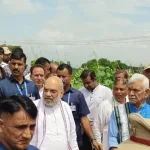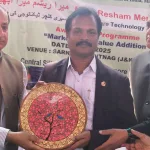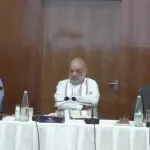Drought in summer and floods in rainy season has become a common thing now. The intensity of climate change and global warming and the challenges of water management are creating new types of water crisis in many countries of the world including India. Water refugees from many countries are going to other countries. Many countries of Asia, Africa, Europe, and America are constantly facing the fury of drought year after year due to sudden floods and then due to lack of rain. Now, not only villages, but cities are being washed away in many places during the rainy season.
Due to the sudden submergence of small and big cities in mountainous regions and dense areas of villages, towns and cities situated in the belt of rivers, not only the human life is destroyed, but, a large number of other creatures, animals, birds, plants and millions of types of micro-organisms also get destroyed within no time. Big buildings would collapse, bridges and roads would collapse, the ground would crack, factories would sink, mountains would break and people’s lives would get disrupted. We should understand that when the cost of these destroyed structures is estimated in thousands of crores, the cost of humans, trees and other bio-diversity, soil, forests and mountains is not included in that.
In our country too, the discussion about these calamities starts after they happen, lasts for a few days, and then people forget and the administration also forgets. Climate change is not the only reason for these conditions. Behind this is the contemporary concept of our fast economic development, personal, institutional and systemic corruption and destruction of natural water protection structures and many natural streams (also their natural path), oceanic factors such as El Nino and La Nina, and the direction and speed of wind currents, etc. also affect weather patterns.
We have to understand that when it rains so much, which would wash away the cities, then why is the drought increasing so much. Is it not strange that flood comes immediately after the drought and after a few days of flood it becomes dry. People are affected by floods in one area, and drought in another area. On one hand, we are not able to find a way to deal with disasters like flood and drought; on the other hand, we are celebrating new technologies and innovative management capabilities and economic growth.
In fact, in the second half of the last century, the principles of science and global economics that we believed in and propagated all over the world, carried the concept of development on the basis of flow of money. Science is used for technology and technology for industrialization. These industries made indiscriminate use of limited natural resources, in which they were continuously separated from their original natural system in large quantities and marketable goods were made from them, which would make the lives of people additional convenient, complete and comfortable. Economics gave the alluring slogan of more production and global market in the name of raising more money, cheaper goods and providing employment to more people. But it is not noticed that in this process more natural resources are being destroyed, due to which the natural system is being destroyed. More emissions are occurring, which is the cause of climate change and global warming, and more wastes are being produced, which are depleting water, land, air and food. The gross neglect of environmental management done during that period and the increasing obstruction in the way of water sources and development in water areas, and mountainous areas beyond their capacity, are repeating these disastrous situations again and again.
To overcome this, we have to integrate the eco-system with the sacred philosophy of our ancient societies, balance its exploitation and change the philosophy of contemporary development. Globally, the United Nations has created a blueprint through the Green Economy and Sustainable Development Goals, but their implementation calls for radical changes in our development, philosophy and methodology. How much we will adopt this in the race for rapid heavy industry based development is hard to say.
(The Author is Associate Professor/Sr. Scientist at SKUAST-K, Shalimar, Srinagar. Email: [email protected])





